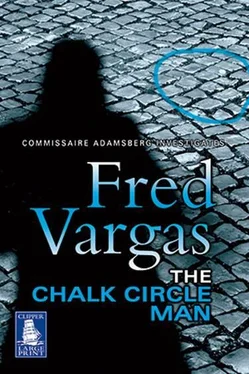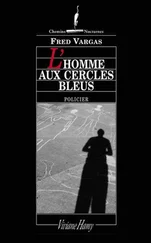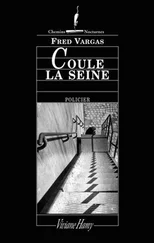‘Never heard of the damn thing till Charles recited it from memory for me at lunch time today. And as for whatever I was shouting about at the Dodin Bouffant , it’s no good trying to get me to remember it. All I can tell you is that when I’ve had a few drinks, my stories multiply reality by about thirty. It’s not impossible that I boasted that the chalk circle man came to dinner with me, and shared my bath, or my bed, or that we planned his nocturnal tricks together. Once I start showing off, nothing is too outrageous. So, you can imagine. Sometimes I act like a natural disaster, as my philosopher friend takes care to tell me.’
Adamsberg pulled a face.
‘I find it hard to forget you’re a scientist,’ he said. ‘I don’t think you’re as unpredictable as you make out.’
‘So, Adamsberg, you think I cut Madeleine Châtelain’s throat? It’s true I don’t have a respectable alibi for that evening – nobody checks when I come and go. There’s no man sharing my bed at the moment, and there’s no concierge for our block: I’m as free as the wind, as free as the mice. So what is this poor woman supposed to have done to me to prompt this?’
‘Everyone has their secrets. Danglard would say that since you spend your time following thousands of people, Madeleine Châtelain could figure somewhere in your notes.’
‘It’s not impossible.’
‘He would add that in your underwater career you are known to have slit the bellies of two blue sharks. You’re capable of determination, courage and strength.’
‘Oh, come on, you’re not going to shelter behind someone else’s arguments, are you? Danglard this, Danglard that. What about you?’
‘Danglard’s a thinker. I listen to what he says. In my view, only one thing matters: the chalk circle man and his wretched outings. Nothing else. Take Charles Reyer, now – what do you know about him? It’s impossible to tell which of you first sought the other out. It looks as if it was you, but perhaps he forced your hand.’
There was a silence, then Mathilde said:
‘Do you really think I’d allow myself to be manipulated like that?’
At this difference in her tone, Adamsberg interrupted the doodling he had started. Sitting opposite, she was staring at him, smiling, grand and generous, very sure of herself, regal, as if she could demolish his office and the rest of the world with a simple mocking remark. So he spoke slowly, chancing some new ideas suggested by her expression. Resting his cheek on his hand, he said:
‘When you came to the police station the first time it wasn’t because you were looking for Charles Reyer, was it?’
Mathilde laughed.
‘Yes, I was looking for him! But I could have found him without your help, you know.’
‘Of course. It was stupid of me. But you’re a splendid liar. So what game are we playing here? Who were you really looking for? Me?’
‘Yes, you.’
‘Simple curiosity, because my appointment had been announced in the papers? You wanted to add me to your collection? No, it wasn’t that.’
‘No, of course not,’ said Mathilde.
‘ To talk about the chalk circle man, as Danglard thinks?’
‘No, not even that. If it hadn’t been for the press cuttings you had under the desk lamp, I wouldn’t have thought of that. You’re free not to believe me, of course, now that you know I’m thoroughly unreliable.’
Adamsberg shook his head. He felt he was on the wrong track.
‘It was because I got a letter,’ Mathilde continued. ‘It said: “I have just heard that Jean-Baptiste has been appointed to a job in Paris. Please go and take a look.” So I came to take a look, as was natural. There are no coincidences in this life, as you well know.’
Mathilde inhaled smoke, with a smile. She was really enjoying all this, was Mathilde. Yes, she was having a ball, in her damned section of the damned week.
‘Tell me the rest, Madame Forestier. Who was the letter from? Who are we talking about?’
‘Our beautiful traveller. Sweeter than me, more shy, less disreputable, less bohemian. My daughter Camille, my daughter. But you were right in one respect, Adamsberg. Richard III is dead.’
Afterwards, Adamsberg could not have said whether Mathilde left immediately or a little while later. Disconnected as he was at this moment, one thing had echoed round inside in his head. She was alive, Camille was alive. His petite chérie , never mind where, never mind who she was with, she was breathing, her obstinate forehead, her tender lips, her wisdom, her futility, her silhouette, they were all alive and well.
Only later, as he was walking home – having posted men for the night at the Saint-Georges and Pigalle metro stations, despite a feeling that it was pointless – did he realise what he had learned. Camille was Mathilde Forestier’s daughter. Well, of course. Even though Mathilde was a great mystifier, there was no point bothering to check it out. Profiles like that weren’t mass-produced.
There is no such thing as coincidence. His petite chérie , somewhere in the world, had read a French newspaper and learned about his posting, then had written to her mother. Perhaps she wrote to her often. Perhaps they even saw each other often. It was possible indeed that Mathilde managed to make the destinations of her scientific expeditions correspond to wherever her daughter was at the time. In fact, Adamsberg was certain of it. He would only have to find out which coasts Mathilde had been working from for the last few years to know where Camille had been. So he had been right. She had been travelling, lost and out of reach. Out of reach. He realised that. He never would manage to catch hold of her. But she had wanted to know what was happening to him. He hadn’t melted from her mind like wax. But then he had never had any doubt about that. Not that he thought himself unforgettable. All the same, he felt that a little piece of him had lodged like a tiny stone, somewhere in Camille, and that she too must be carrying him round inside her like a weight, infinitesimal though it might be. It was inevitable. It had to be. However vain human love appeared to him, and however dark his feeling today, he could not admit that some magnetised fragment of that love was not still lodged somewhere in Camille’s body. Just as he knew, although he rarely thought about it, that he had never allowed Camille’s existence to dissolve from inside himself, though he couldn’t have said why, because he had not consciously thought about it.
What bothered him, and even distracted him from the far country where his mood of indifference had taken him, was that now he would only have to ask Mathilde to find out. Just to find out. To find out, for instance, whether Camille loved someone else. But it was better not to know, and to keep on imagining the bellhop in the Cairo hotel where he had left off last time. The bellhop was good-looking, dark, with long eyelashes, and it was just for a couple of nights, since he had got rid of the cockroaches in the bathroom. And in any case, Mathilde wouldn’t tell him. They wouldn’t speak about it any more. Not a word about the girl who was taking both of them on journeys from Egypt to the Paris suburbs, and that was that. But what if she really was in the Paris suburbs? She was alive, that was all that Mathilde had wanted to tell him. So she had kept the promise she had made the other night at the Saint-Georges metro station. She had removed that death from his head.
Perhaps too, since Mathilde felt herself under threat from the police and their harassing questions, she had been setting out to make herself untouchable. To let him know that if he went on harassing the mother he would distress the daughter. No, that wasn’t Mathilde’s style. There was no future in talking about it any more; it was a closed subject, full stop. He had to leave Camille wherever she was, and carry on the inquiries surrounding Madame Forestier without deviating from his course. That was what the investigating magistrate had said earlier that afternoon. ‘No deviating from the course of the inquiry, Adamsberg.’ But what course? A course assumed a plan, some future laid out ahead, and in this case Adamsberg had less of a plan than ever before. He was waiting for the chalk circle man. This man didn’t seem to trouble many people. But for him, the man behind the circles was a creature who laughed at night and pulled cruel faces during the day. A man who was difficult to catch, disguised, putrid and feathery like moths of the night, and the thought of him was repulsive, giving Adamsberg the shivers. How could Mathilde possibly think the man was ‘harmless’ and take a ridiculous pleasure in following him around as he drew his deadly circles? That was an example, whatever he might say, of Mathilde’s fantastic recklessness. And how could Danglard, the learned and deep Danglard, also be certain this man was innocent, expelling him from his thoughts, whereas in Adamsberg’s mind he was crouching like a malevolent spider? But perhaps he, Adamsberg, was going desperately wrong? Too bad, if so. He had only ever been able to follow his own train of thought, wherever it took him. And whatever happened, he would keep on chasing this deadly man. And he would see him, he had to. Perhaps when he saw him he would change his mind. Perhaps. He would wait. He was sure that the chalk circle man would come to him. The day after tomorrow. The day after tomorrow, perhaps, there would be a new circle.
Читать дальше












